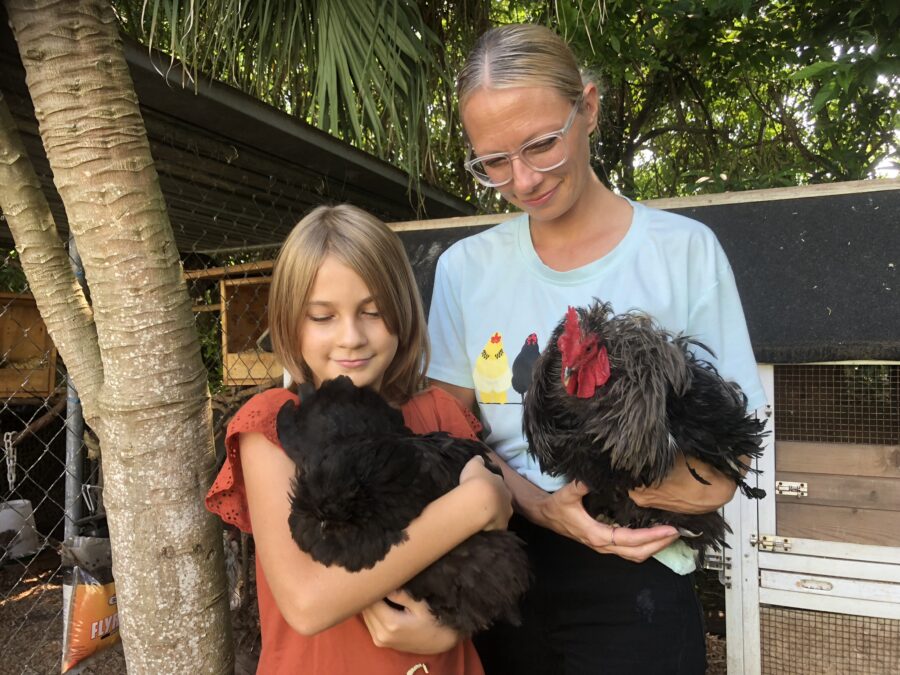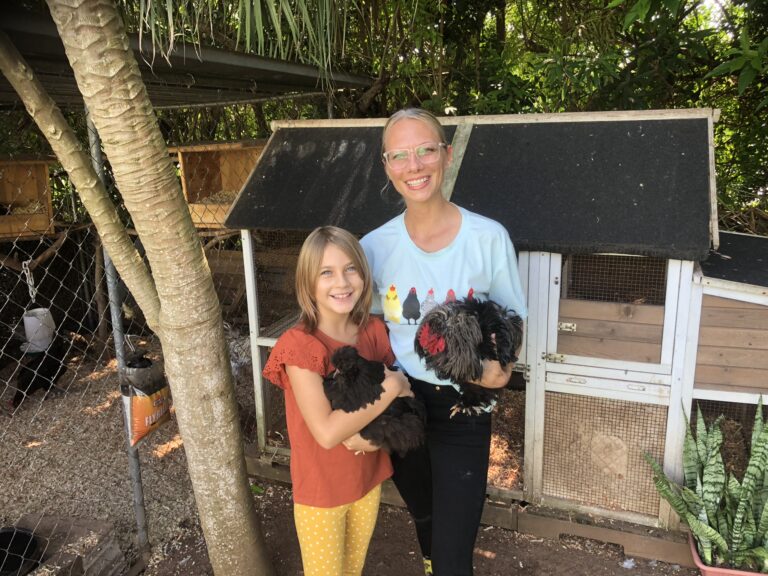According to the Government of Bermuda’s Feral Chicken Management Plan, chickens were first introduced to Bermuda by settlers as a food supply and by 1620 it was already common for most households to have a flock of semi-wild chickens roaming around in the yard.
Although keeping chickens dramatically decreased in popularity once refrigeration and modern shipping methods became readily available, people are once again taking an interest in raising chickens in part due to an increased awareness in the benefits of organic food of all types, and in part due to the spiralling cost of eggs and groceries in general as a result of the pandemic.
While chickens can be surprisingly simple to care for once established, “keeping chickens” at home is entirely different from feeding feral chickens when you visit the park, (a practice which although well-intentioned, you must not engage in because it just compounds an ongoing problem by encouraging our enormous feral population to continue breeding).
What is the correct way to care for chickens at home?
It is important to understand that domesticated (or farmyard birds) are a lifelong responsibility just like cats and dogs, and it is actually illegal to allow them wander away from your property or release them into a park or golf course if you lose interest or are no longer able to care for them.
That said, done correctly, keeping chickens can be a highly enjoyable activity that the whole family can assist with – in addition to being a continuous source of nutritious organic eggs.
I reached out to Shannon DeCosta who operates Little Cluckers Farm and the Bermuda Facebook Group “Just Chickens” (a page full of advice for anyone considering raising chickens).
Ms. DeCosta first began raising chickens when her young daughter Selena arrived home one day with six baby chicks that she had scooped up on the side of the road. Realizing that she could not simply turn them loose again because they had been separated from their mother, she adopted them as pets.
 HOUSING & SHELTER
HOUSING & SHELTER
Chickens can only regulate their body temperature through their feet so in Bermuda’s hot climate it’s important to provide them with a shaded, ventilated, fully fenced environment which gives them space to roam about and also provides adequate protection from predators and extreme weather.
“This can be as simple as a DIY wire enclosure with a wooden nesting box and a couple of tree branches for roosts, or a fancy purpose-built chicken coop,” says Ms. DeCosta. “When Selena’s chicks were very small, we initially kept them in a plastic tub in the house, and as they grew, we put them in larger and larger containers until they were big enough to be transferred outside.”
ROOSTING, BROODING & EGG PRODUCTION
Interestingly chickens cannot see in the dark so they will naturally put themselves to bed at sunset and sleep continuously until sunrise. But even in a fully enclosed area, they need an elevated place to sleep so that they can feel safe from predators.
Once domesticated, all hens will lay eggs on a regular basis although the quantity of eggs does vary from breed to breed. A Rhode Island Red hen, for example, will typically lay an egg every day, while other breeds usually lay about four eggs a week.
A chicken who feels a strong urge to hatch eggs is referred to as being “broody”. When a chicken is feeling broody, she will stop laying eggs and sit in her nesting box all day every day for about 21 days – only emerging for 20-30 minutes once a day in order to eat and drink.
If she is allowed to sit on eggs during this time, these eggs will eventually hatch and on average the mother hen will care for the chicks for 4-8 weeks until they are old enough to fend for themselves.
FOOD AND WATER
Chickens are omnivores and will eat just about anything. Ms. DeCosta recommends a mixture of feed from Noah’s Ark (which stocks just about everything that your chickens could ever need) as well as food scraps such as apples, lettuce, watermelon rind and corn on the cob. They are also natural foragers and will often scratch and peck at the ground to supplement their diet with insects, worms, and small plants.
“It is also important to provide your chickens with plenty of fresh water every day,” says Ms. DeCosta, “Both because they drink quite a bit in Bermuda’s heat, but also because they often like to stand in their water bowls to cool themselves down”.
WASTE MANAGEMENT
As you might imagine, properly managing chicken waste is important to prevent odour and potential health issues. Make sure that you layer the bottom of their containment area with sawdust or wood shavings and change it on a regular basis to prevent the spread of disease.
“Learning about composting chicken manure is a great way to cut down on waste and has the added benefit of creating nutrient-rich organic fertilizer for your garden”, says Ms. DeCosta.
Do feral chickens make good domestic pets?
To some extent this might depend on who you ask. In Ms. DeCosta’s case the feral chicks that she and Selena adopted off the side of the road not only provided great entertainment, but they also grew up to be better egg producers than many of the domestic breeds she later paid for.
“Just be sure that you are properly prepared to give them a ‘forever home’ before taking them in,” she cautioned.
Keeping chickens can be an educational and enjoyable hobby for the whole family which provides fresh eggs and increases food security. For Ms. DeCosta her interest in egg production has even grown into a small business and she currently supplies eggs to The Tuck Shop on Middle Road Southampton.

